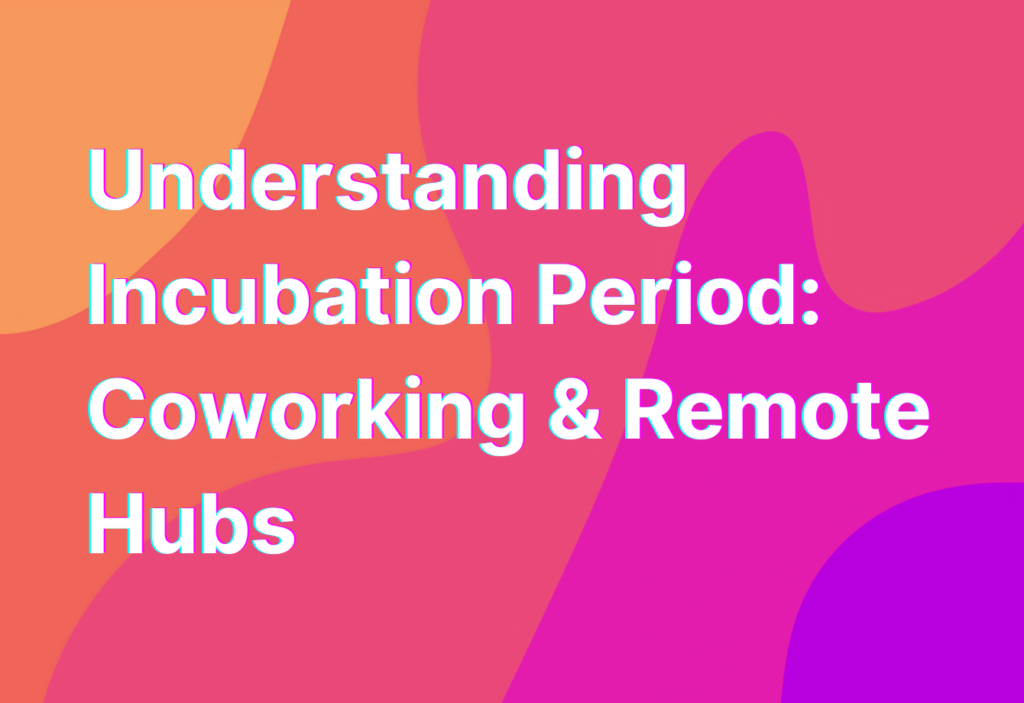Understanding Incubation Period: Coworking & Remote Hubs
Hey there, remote work enthusiasts! Today, we’re going to dive into the fascinating world of incubation periods in the context of coworking and remote hubs. If you’re not familiar with the term, don’t worry, we’ve got you covered. So, grab your favorite cup of coffee and let’s get started!
What is an Incubation Period?
An incubation period, in the context of coworking and remote hubs, refers to the time it takes for individuals or teams to adapt and settle into a new work environment. It’s like the adjustment phase when you start a new job, but in this case, it’s specifically related to the transition into a coworking space or a remote hub.
During the incubation period, remote workers go through a series of experiences and emotions as they acclimate to their new surroundings. It’s a crucial time that can greatly impact their productivity, collaboration, and overall satisfaction with their work setup.
Factors Affecting the Incubation Period
Now, you might be wondering, what factors influence the length of the incubation period? Well, there are several key elements that can either speed up or prolong the adjustment phase. Let’s take a look at some of them:
- Workspace Design: The physical layout and design of the coworking space or remote hub can significantly impact how quickly individuals adapt. A well-designed space that promotes collaboration and provides comfortable amenities can help shorten the incubation period.
- Community and Networking: The presence of a supportive and engaging community within the coworking space or remote hub can greatly facilitate the adjustment process. When individuals feel connected and have opportunities to network with like-minded professionals, they tend to settle in more quickly.
- Work-Life Balance: Achieving a healthy work-life balance is essential for remote workers. Coworking spaces and remote hubs that prioritize work-life balance through flexible schedules, wellness programs, and recreational activities can help individuals find their rhythm faster.
- Technology and Infrastructure: Seamless access to reliable internet, modern technology, and essential office infrastructure is crucial for remote workers. A well-equipped coworking space or remote hub can significantly reduce the time it takes for individuals to adapt to their new work environment.
- Support and Resources: The availability of support services and resources within the coworking space or remote hub can greatly assist individuals during their incubation period. Whether it’s mentorship programs, educational workshops, or professional development opportunities, these resources can help remote workers settle in more smoothly.
The Benefits of a Short Incubation Period
Now that we understand what an incubation period is and the factors that influence its length, let’s explore why a shorter incubation period is beneficial for remote workers and the overall success of coworking spaces and remote hubs.
When individuals adapt quickly to their new work environment, they can hit the ground running and start being productive sooner. This not only benefits the individual but also contributes to the overall productivity and success of the coworking space or remote hub.
A shorter incubation period also fosters a sense of belonging and community among remote workers. When individuals feel comfortable and connected, they are more likely to collaborate, share ideas, and support each other, creating a vibrant and thriving work ecosystem.
Additionally, a shorter incubation period can lead to higher job satisfaction and overall well-being for remote workers. When individuals feel settled and supported, they are more likely to enjoy their work and experience a better work-life balance.
Wrapping Up
And there you have it, folks! We’ve explored the concept of the incubation period in the context of coworking and remote hubs. Remember, a well-designed workspace, a supportive community, and access to resources can greatly shorten the adjustment phase for remote workers.
If you’re interested in learning more about job crafting in coworking and remote work hubs, check out our Job Crafting page for some valuable insights.
Until next time, happy remote working!


